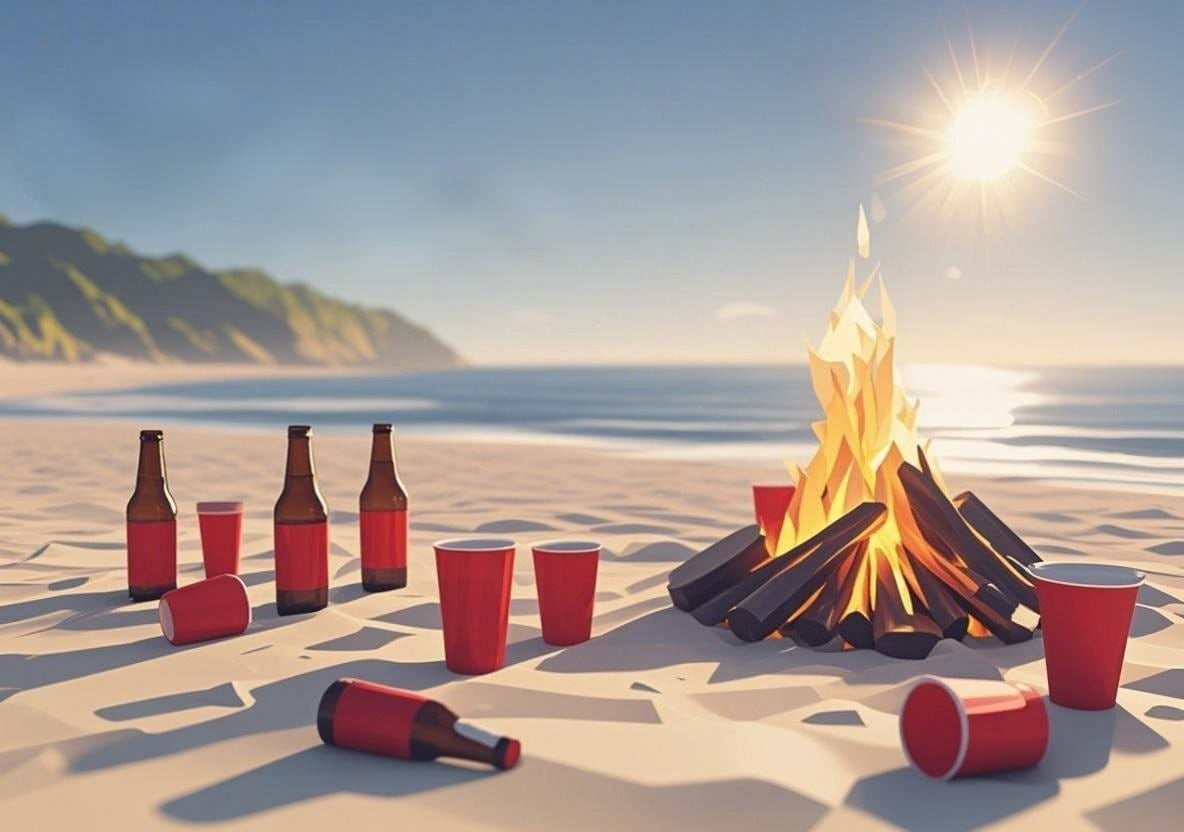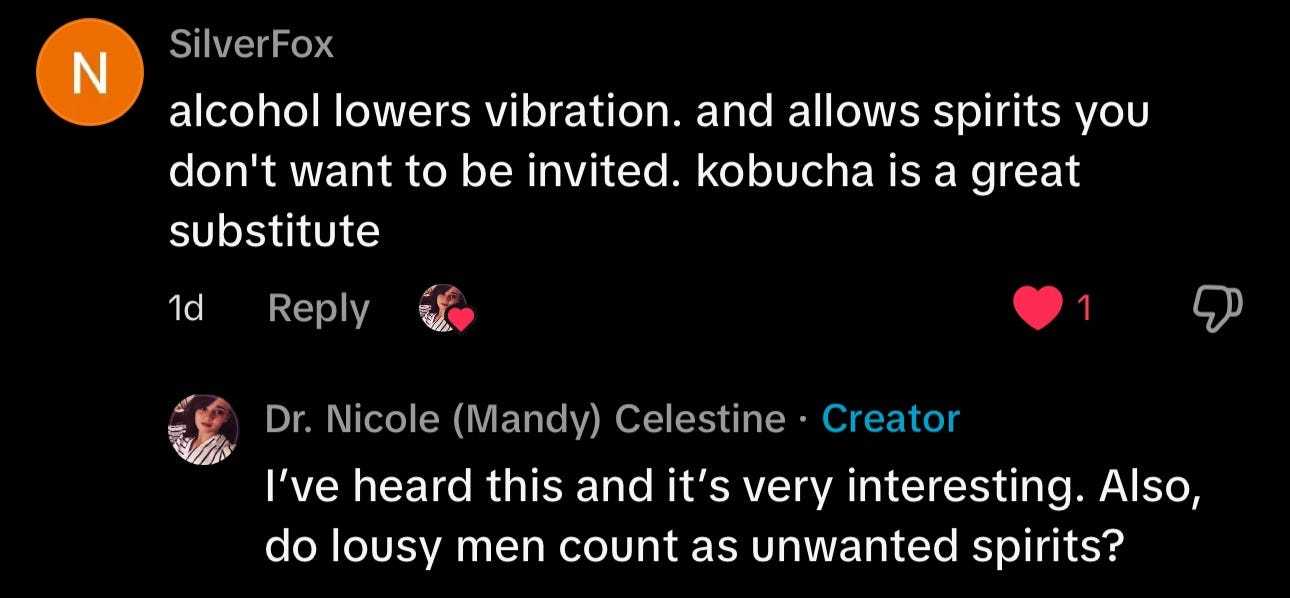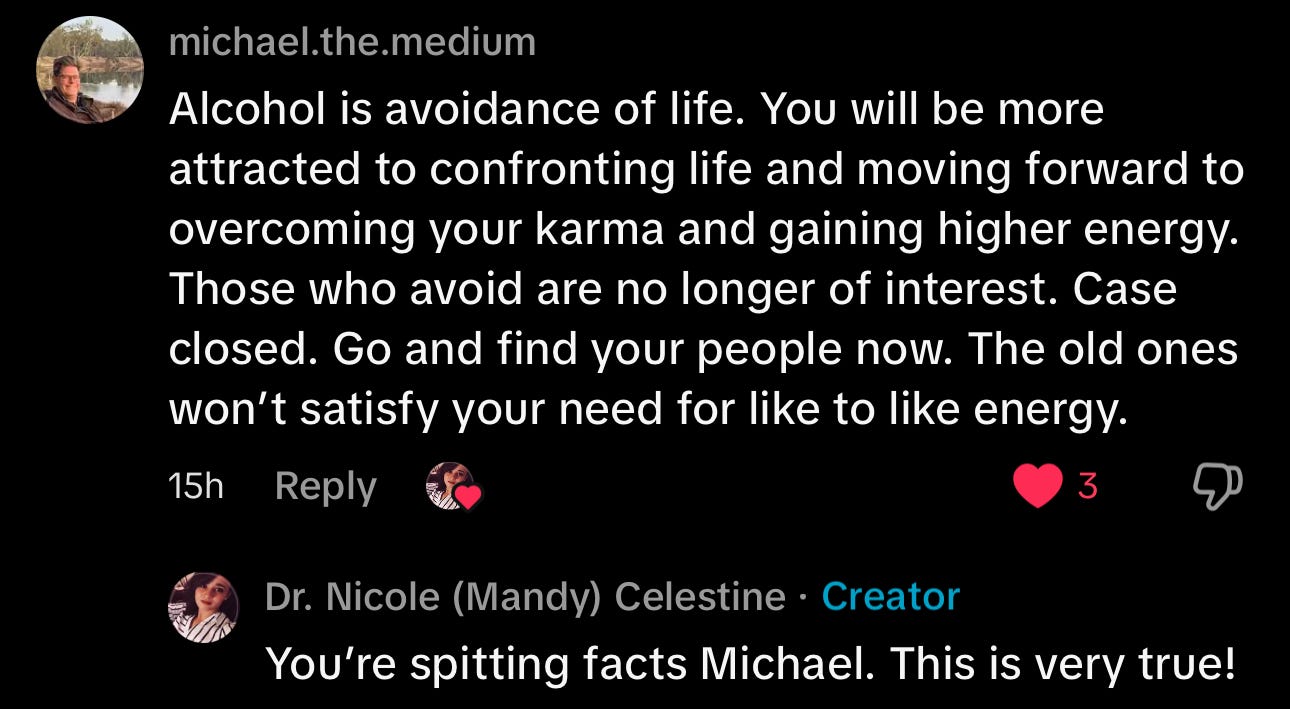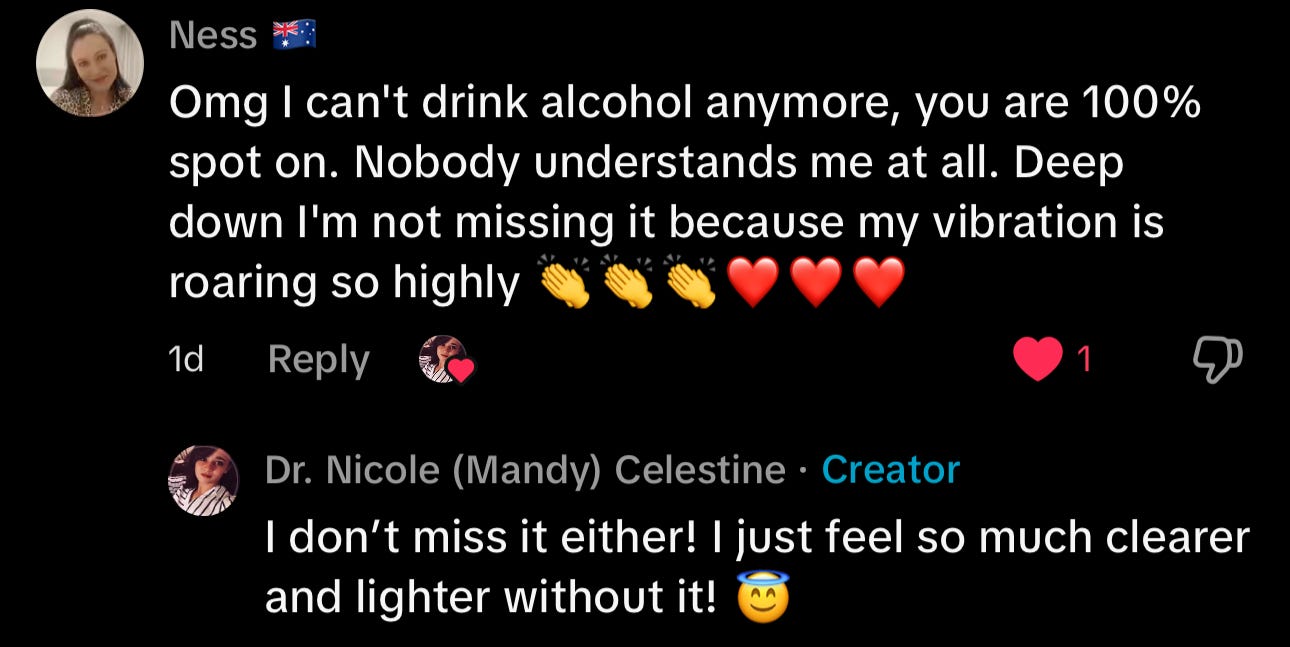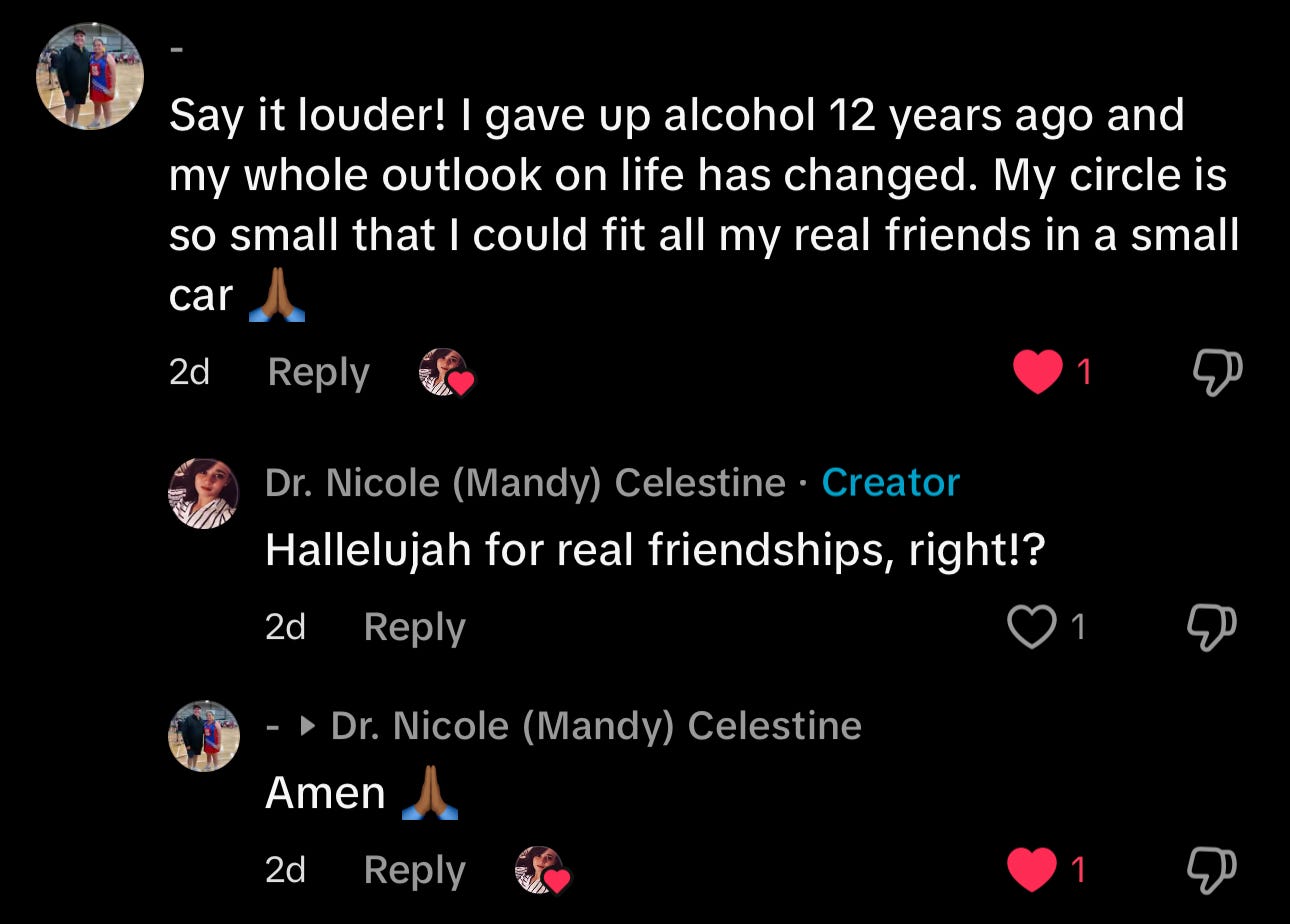So You Got Spiritual and Now Your Friends Think You're Boring
Vibe Report: The Effects of Alcohol on Psycho-Spiritual Development
Apparently, I’m letting TikTok decide what I write about now.
And honestly? That feels fair. At least I’m making up for all those years spent navel-gazing in the ivory tower, writing for six people and a citation tracker.
This week, I generated a mild stir by saying something very simple:
If you’re Australian and you’re getting into spirituality, you might lose your taste for alcohol. And when that happens? Good luck trying to explain it to your mates.
Here’s the video:
And here’s the transcript of what I said (minus the accent and half the f-bombs):
“When you’re into spirituality, something changes with your brain and you lose interest in things you enjoy—and one of those things is alcohol.
But our culture was built on alcohol. It’s like the glue holding all our friendships together. Apparently, having a conversation without a pair of pints between you is too fuckin’ intimate… You try to explain this to your friends and they just don’t get it. So you say ‘no’ [to a drink], and you know what they’re thinking, even though they don’t say it. They’re just like… ‘Does she think she’s fuckin’ better than us?’”
This hit a nerve. Three, actually: Spiritual panic. Social crisis. And quiet triumph.
Let’s look at each, one by one.
1. The Spiritual Side: Religion and Energy
Some people zeroed in on the religious and metaphysical side of consuming alcohol.
Religious traditions (think Islam, some forms of Buddhism) often frame alcohol consumption as shameful.12 But beneath the morality is mysticism, which I find more interesting than religion’s dogmatic take on things.
In mysticism, alcohol is said to do two things:
Punch holes in your energy field, making you more open to spiritual interference (e.g., unhelpful energies, spirits, or entities)
Lower your vibration—which equates to being less present and more reactive
In some traditions, this first point gets taken quite literally.
You're not just ‘acting weird’ when you drink—you’re being inhabited.
Whether or not you believe that’s true doesn’t really matter. If you’ve ever seen someone drunk get overtaken by rage, lust, or some chaotic blend of the two, you’ve already witnessed this principle at work because it’s the same process, just described in different language.3
The second point about presence also really matters.
Most mystical traditions agree that being present—like, deeply, exquisitely present—is the gold standard. It’s the prize. It’s what we’re all trying to get to, whether through meditation, breathwork, or just being less of an anxious, distracted wreck.
Once you’ve had a taste of clear, present-moment awareness—the kind that feels like floating on the ocean while the world rages on—you start to notice how much alcohol messes with it.
The more you drink, the more that peaceful awareness starts to sink.4 And if your practice has trained you to stay in that floating state, you’ll feel the drop like a slap.
That’s why people who’ve spent years cultivating mindfulness often report that drinking starts to feel off. Not because they’re puritans, but because presence simply feels more enjoyable.
2. The Culture Clash: Sobriety vs. Belonging
Here’s where things got personal.
A huge portion of the comments were from people who’d tried to go sober—or even just drink less—and instantly felt like they’d been kicked out of the tribe.
Because in Australia, booze isn’t just a drink. It’s a signal. A nonverbal contract: “We’re safe here. We won’t judge you. You can relax.”
Take the beer away, and the silence gets real loud.
Alcohol, in many ways, lets people bypass the discomfort of authenticity. It’s a shortcut to emotional expression without the terrifying clarity of full presence. You can be real—but only if you’re slightly too numb to notice.
But true growth—real, terrifying, soul-expanding growth—requires you to do the scary thing while fully present, whether that’s expressing emotion, speaking truth, or setting boundaries. It’s literal exposure therapy, and most people don’t want to do it.
If that idea interests you, you can read more about it here:
The Art of Getting Away with Being Yourself
Psychologists throw around a lot of definitions for social anxiety—fear of judgment, hyper self-consciousness, a survival instinct run amok. But I think a simpler definition is this.
So, what happens when you’re the only one in your group who doesn’t want to numb out? You become the mirror. The threat. The walking reminder that other people might have to feel their feelings on purpose.
And people don’t always love that.
Consequently, several commenters shared stories of being subtly iced out or mocked for quitting. Some even felt they had to hide their sobriety—ordering soda in a cocktail glass just to avoid social awkwardness.
3. The Other Side: Losing Friends, Finding Better Ones
But it wasn’t all grim. For every person who lost a few mates, there was someone else who found better ones.
People spoke about:
Discovering the joy of their own company
Finding friends who valued depth over drama
Learning that real connection doesn’t need liquid courage
Turns out, when you stop drinking, the people who stick around are usually the ones who like you for your actual personality. Wild.
I’ll let those comments speak for themselves:
The Real Work: Feeling Things Without a Filter
What this all boils down to is pretty simple.
Alcohol lets us do scary things—open up, be messy, feel real—without being fully there for it. But the real growth? The real transformation?
That comes from doing those things while stone-cold sober.
Not because you’ve got something to prove. But because you’ve finally got the presence to stay with yourself while you do.
And when you can do that? You stop needing the beer. Or the party. Or the approval.
You just need you.
Thanks for reading. If you’re on the path of choosing clarity over comfort, and learning to sit with yourself rather than escape yourself, you’re not alone. Consider subscribing for more weekly reflections on culture, conditioning, and waking up to the stuff most people would rather ignore—there’ll be plenty more to come.
Al‐Ansari, B., Thow, A. M., Day, C. A., & Conigrave, K. M. (2016). Extent of alcohol prohibition in civil policy in Muslim majority countries: The impact of globalization. Addiction, 111(10), 1703-1713.
Harvey, P. (2012). An introduction to Buddhist ethics: Foundations, values and issues. Cambridge University Press.
Peterson, J. B. (2023, 17 March). How many gods are there? | Biblical Series: Exodus [Video]. Facebook. https://www.facebook.com/watch/?v=467087368880141&t=520
Tolle, E. (2022, December 29). Is alcohol bad for spiritual awakening? | Eckhart Tolle explains [Video]. YouTube.



